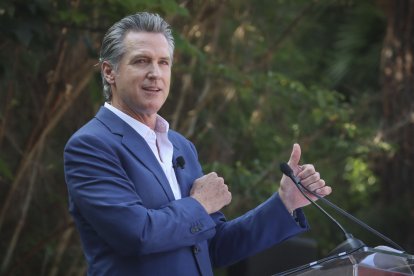California: Unemployment benefits system is 'broken' and owes $20 billion to federal government
According to a report by the state's Legislative Analyst, California's unemployment insurance needs a total restructuring.

California Gov. Gavin Newsom
California's finances are in serious trouble. A new report from the state's Legislative Analyst's Office (LAO), titled "Fixing Unemployment Insurance", noted that California's unemployment insurance (UI) funding system not only faces a large deficit and monstrous debt to the federal government, but it needs a complete restructuring to dig itself out of the hole.
According to the report, this system, which was originally designed to be self-sufficient, is failing to cover annual benefit costs and is producing a projected annual deficit of $2 billion over the next five years while carrying an outstanding $20 billion in loan debt to the federal government.
"This outlook is unprecedented: although the state has, in the past, failed to build robust reserves during periods of economic growth, it has never before run persistent deficits during one of these periods," read the LAO report released Tuesday.
This situation is of great concern to independent analysts, who project an increase in California's federal borrowing due to ongoing annual deficits. This translates into an extra $1 billion in interest costs for California taxpayers each year.
The report pointedly notes that the system, which has not been updated since 1984 and relies on employer payments to the Unemployment Insurance Trust Fund, "cannot keep up with inflation or provide the intended wage replacement of half of workers’ wages."
One concern analysts have is the pace of debt, which today lies on the shoulders of businesses following the federal government's loan to California in the midst of the pandemic.
The report details that the decades-long problem exploded during COVID-19, when California's unemployment system was inundated by the overwhelming number of jobless claims.
The solution chosen at the time by California officials was to borrow $20 billion from the federal government to cover the insurance benefits, but now that debt is being absorbed by businesses and taxpayers in the Golden State and, according to the report, will not be able to be paid by California's tax system.
"Not only will the state’s tax system fall short of repaying that loan, the balance is set to grow due to the ongoing gap between contributions and benefits," the report concludes. "This will become a near-permanent feature of the state’s UI program and a major ongoing cost for state taxpayers."
RECOMMENDATION























